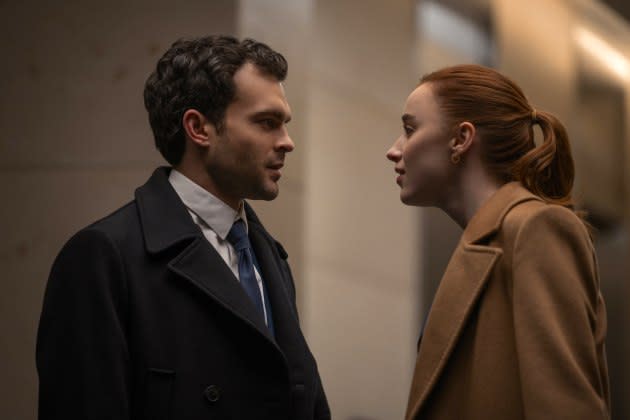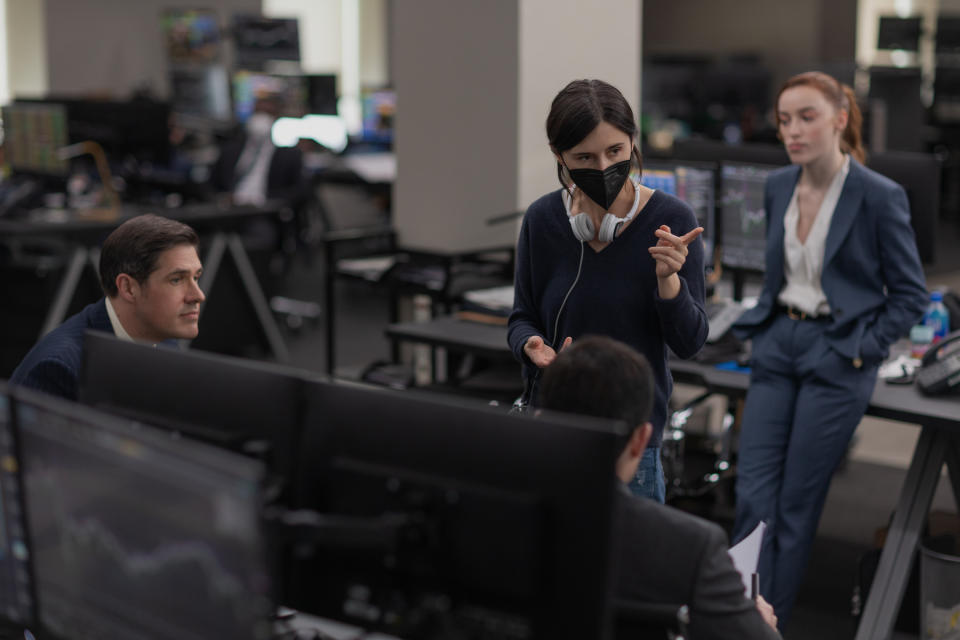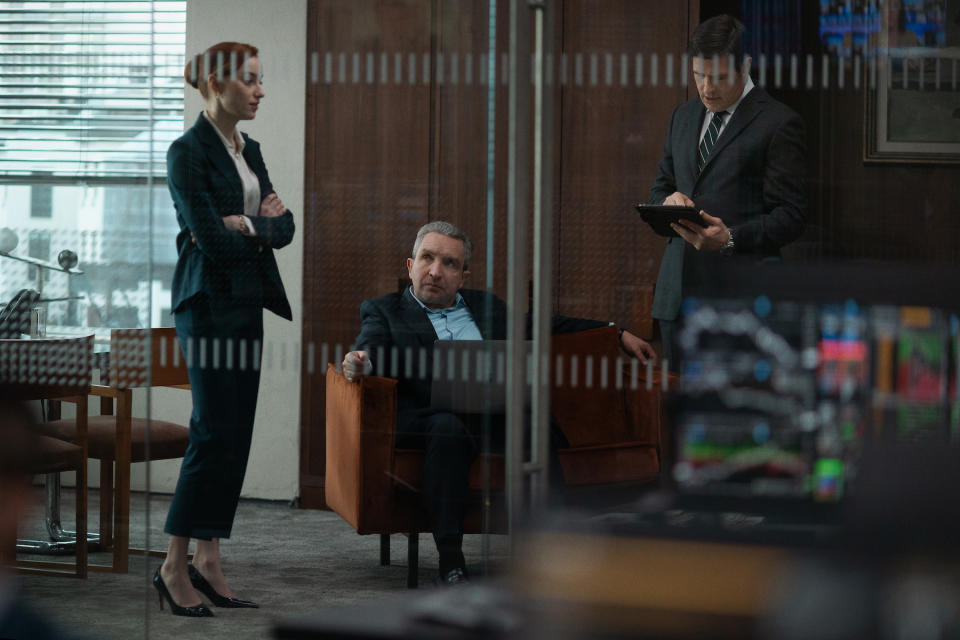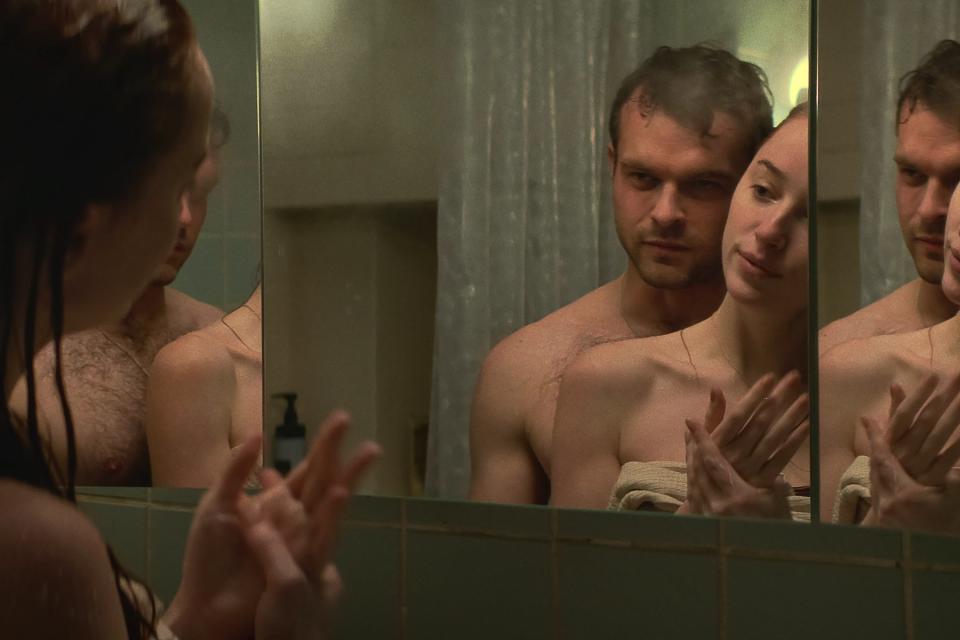‘Fair Play’ Director Chloe Domont on Consent and That Shocking Ending
- Oops!Something went wrong.Please try again later.

It’s late summer, and I’m seated across from Chloe Domont in a congested Brooklyn coffee shop. Both the writers’ and actors’ strikes are in full effect, creating an air of unease. This should be a time of celebration for Domont, whose first feature Fair Play — a sexy psychological thriller about a hedge fund couple, Emily (Phoebe Dynevor) and Luke (Alden Ehrenreich), whose relationship unravels when he discovers that she got the promotion he thought was his — is about to be unleashed on the public after earning raves and igniting a fierce bidding war at Sundance that ended with a $20 million purchase by Netflix. But instead, Domont is out promoting the film all by her lonesome, sans her two dynamic stars who both deliver career-best performances.
“It’s a strange time for any movie to be coming out,” says Domont.
More from Rolling Stone
Julia Ormond Explains Why She's Taking on Weinstein, CAA, and Disney
'Love Is Blind' Contestant Claims Ex-Fiancé Sexually Assaulted Her on Set
When Emily is rightly awarded the promotion at One Crest Capital, a cutthroat New York City hedge fund run by Campbell (Eddie Marsan), Luke goes through all the stages of the bruised male ego: surprise, resentment, disparagement, and retaliation. The only way Luke feels he can take back his power is through a disturbing act of violence.
“I wanted to explore the dangers of male inferiority and to show how women have to play ugly to survive, Domont tells Rolling Stone.
Fair Play is a remarkably self-assured filmmaking debut from Domont, who cut her teeth directing a number of short films as well as episodes of Ballers and Billions — shows set in male-dominated environments where women are few and far between. Early in its development, Rian Johnson’s production company T-Street came onboard, and Domont showed the film to Johnson’s partner, journalist and podcast host Karina Longworth, who “gave really great notes.”
Domont tortured herself over the making of Fair Play, trying to perfect it on every possible level. She describes its filmmaking process — extensive rehearsals, followed by a 28-day shoot in Serbia and two days in New York City to capture exteriors — as “absolutely relentless,” adding that “it took everything from me.” But the result is one of the most gripping, taut and tense films of the year with an ending that has kept audiences talking since its Sundance premiere.
Her next movie, she says, will be an indie in a completely different genre.
“I know what the next four movies are, and they are on a bigger and bigger scale,” offers Domont. “But they’re always going to be provocative and ask tough questions of the audience.”
Warning: This piece discusses the film’s ending.
What was the genesis of Fair Play? Did you have a bad experience with a finance bro?
[Laughs] Not a finance bro — but bros, yes. It came from that feeling I was having at a certain point in my life when my success, or any moments of accomplishment I had, didn’t feel like a win. It felt like a loss. And it was because the men I was dating at the time felt threatened by me in some way. This is never anything I’ve spoken about. It just felt like me being big on some level equated to them feeling small.

Were they working in the same industry as you?
Yes.
Fair Play does explore the fragility of the male ego. Luke goes on this very ugly journey, and Alden and Phoebe were interesting choices for these roles. Alden so often plays fun, likable guys, and Phoebe is best known for playing this paragon of chastity on Bridgerton.
That’s what excites me as a director — is to cast against type, or to cast actors who haven’t done anything like this before. That went for Alden, Phoebe, and Eddie Marsan. In terms of Alden, I knew that it was going to take an incredibly confident man and person to play that level of insecurity and be willing to go there. He brought such humility to the character, and I think he’s an incredibly strong, versatile actor who can do anything. It was a gut feeling for both of them [after] meeting them and seeing their previous work.
I wasn’t a fan of Bridgerton and saw Phoebe in this and was blown away. I don’t think that was a role that did the best job of showcasing her talent.
She’s this English rose [in Bridgerton]. I only saw the pilot and that was enough for me to know that Phoebe had it. I was watching her performance in that and could tell that she was incredibly present and super dialed-in. I could sense a vulnerability and a warmth, but also a fierceness there. I could see enough potential, and after meeting with her I had complete confidence in the way she spoke about the script, the way she related to the character, and the way she was ready to dive in headfirst.
Did you have a lot of top actors vying for these roles? Because this is a really tight script with some meaty characters.
I would say that the character of Emily was very quick to cast. But the character of Luke scared a lot of young male actors. They were afraid to go there and take this on, which is why I have so much respect for Alden. A lot of the male actors we were considering were too afraid.
Hollywood movie stars do tend to shy away from playing contemporary cretins. Perhaps they’re worried about whether it will alter the public’s perception of them.
I think especially today, when everyone is kind of afraid. Maybe ten years ago it wouldn’t have been the case, but now people are afraid of any little thing that will affect their image in some way. But it’s just like, we’re here to act and tell stories.
I do wonder why Hollywood doesn’t make the type of erotic thrillers I grew up with in the Nineties anymore. Maybe it has to do with foreign box office, which is why we see almost no sex in movies period, and they view it as “too risky,” even though those films were wildly popular and there seems to be a big audience appetite for them. The complicated sexual dynamics have largely moved over to television.
I agree. I don’t know? I ask myself the same question. I’m pretty bored with the state of cinema. I think there’s a huge divide right now: there’s mainstream cinema that’s just focused on “entertainment,” and those films don’t have much substance or meaning, are formulaic, and are afraid to touch on tough subject matters. And then you have other films that have tough subject matters but are also an incredibly tough watch. There aren’t many films out that are bridging the gap there. I’m a filmmaker who believes that the tougher the subject matter is, the more entertaining the film needs to be. And what does “entertainment” mean? I think it means taking the audience on a ride — thrilling them, gripping them, shocking them, mortifying them. That’s how you get an audience to lean into something that they would normally be too scared to touch.
Women are usually treated as ornamentation in films set in the world of finance, but here you have one front and center.
It is a man’s world. I spent some time in that world and there are women in that world, but it’s still a male-dominated world, and the #MeToo movement never hit the finance world. Ever. So, it’s very dated in terms of gender dynamics and power dynamics.
Could you tell me about the time you spent in the finance world?
I came up with the relationship element of the story first, in terms of the arc and where I wanted it to go, and then I was looking for a backdrop to set it against. And my experience with these kinds of dynamics were set in film and TV, so I was looking for a world that was cutthroat, where you could experience these very high highs and low lows on any given day, and we could examine what that does to you and your relationship. For me, it made sense to set it in the finance world, having a lot of friends in that world. Even though I didn’t understand the lingo, I felt like I could emotionally relate to it because it bears similarities to the film world.
I just want to go back to what you were saying about erotic thrillers. I don’t consider this film an erotic thriller. I know some people have been making references to it, and I think there are crossovers for sure, but I don’t think you can really label this film or put it in a box in terms of traditional thrillers. My intention was to make a thriller about power dynamics that happens to be highly sexual and has erotic elements and psychological thriller elements. I believe it’s our job as filmmakers to use, abuse, and twist these genres to make stories now. But if that’s what people want to label it then they’re allowed to label it however they want. That’s not how I would label it.

You’ve directed episodes of Ballers and Billions, which are both set in these very male-dominated worlds. How did those experiences inform the making of Fair Play? Because much of this film is shown through the eyes of a woman looking out at those worlds.
Totally. I’ve worked on a lot of male-dominated shows, so part of it was to tell the story through the female lens. And for me, it was about showing the female journey through these spaces and staying as true to that as possible.
TV directors are treated like guns for hire, and I’m curious what it was like for you to go from project to project directing other people’s stories when you wanted to tell your own.
I’m grateful for those opportunities because they taught me how to become a professional, and I was able to hone a lot of skills as a director by directing in different genres. That kind of experience is invaluable. I felt much more equipped to jump into my first feature because of them. My goal has always been to tell my own stories, and even though they weren’t my stories, in those jobs I was able to build my skillset and hone the craft.
Did you go to The Rock for the Alden character in Fair Play? He definitely wouldn’t have done it.
[Laughs] He definitely wouldn’t have done it.
I wanted to talk about consent in Fair Play and the way it’s bookended. The film opens with a consensual sex act in a bathroom that’s cut short because Emily is on her period, and then closes with a scene in a bathroom where Luke doesn’t listen to Emily and rapes her. What conversations have people been having with you about that assault sequence?
As I mentioned, I intended to make a thriller about power dynamics. Rape is not really about sex; rape is about power. It always had to go there because that’s the only way that male character can take the power back — through physical dominance. For me, it had to go there to earn that final scene where Emily reclaims the power that Luke takes away from her when he sexually assaults her, and finally holds a man accountable who refuses to be held accountable on every single level. Tragically, she has to use the same physical force to get that.
There’s a wish-fulfillment element to that final scene where she has the knife pointed at him and has turned the tables, and he finally approaches a place of emotional truth about what happened because of it.
The whole movie builds up to Luke’s line when he says, “I’m nothing.” Like I said, I wanted to explore the dangers of male inferiority and male fragility, and men who refuse to be held accountable for their actions. Luke is running away from that and has caused so much pain and destruction because of that, so in that final scene it’s Emily deciding that accountability is really important to her. It contrasts with the prior scene where Campbell gives her his 30,000-foot view of the world where he says, “It’s all about the money. Accountability, blame, all this shit — it doesn’t mean anything.” And then she goes into the office the next day and is thinking about it, and observes a young woman being brought in. And she knows everything this woman is about to go through. And then, when she faces Luke in the final showdown, she realizes, “Accountability matters to me.” There is a wish-fulfillment element to it. I wanted to give female audiences something that they maybe haven’t had in their personal lives.
There is a wish-fulfillment element to it. I wanted to give female audiences something that they maybe haven’t had in their personal lives.
Could you talk to me about why you decided to open and close the film with two very different scenes involving blood?
For me, it’s a visual metaphor. It’s telling the audience: don’t get too comfortable. Even though I’m using it in a funny way in the beginning to bond them, it’s the thing that will turn them apart in the end. In terms of the ending, when I was talking about using and twisting genre, I think that no matter how much you do that you still need to pay it off in the end. The ending is where the message and the genre come together in one final punch. The thriller genre uses violence as a means to solve conflict, so I always felt like it had to go there.
It’s striking how much more accommodating she is in the relationship than him. When she thinks he’s gotten the promotion, she has sex with him on her period and drinks champagne in the shower with him. And when she gets it, he sulks and repeatedly belittles her.
Some people will come away from this film thinking Luke is an asshole and some will have more empathy — there’s actually a huge chunk of the audience that goes back and forth between them until that line is crossed in the end. But up until that point, a lot of people are back and forth. My intention was not to make Emily a hero or a victim. My intention was to make Emily a human being who’s flawed, and messy, and has ambitions and desires, and is forced to play ugly to survive in the workplace and in love.
And she’s just so much smarter and more accomplished than he is. We learn that Luke is a nepo baby who is basically struggling to hold on to this job he was gifted.
And at the same time, I think a lot of men will relate to that struggle and dynamic. I don’t necessarily blame Luke for having these feelings. I think it’s a societal — and systemic — problem, because we raise boys to believe that masculinity is an identity when it’s not. It’s an energy. We raise boys to believe that masculinity means one thing, and that success is a zero-sum game. My intention with the Luke character was to say, there are certain men in certain generations caught in the middle between wanting to adhere to a modern, feminist society, but having still been raised on traditional ideas of masculinity. And they’re stuck. Luke adores her because she’s smart and a killer at her job, but he can’t help but feel threatened by all the same things he loves her for because of what was instilled in him. That’s what I wanted to sink my teeth into, and Alden did an incredible job of showing that duality.
I’m reminded a bit of Kanye West relentlessly pursuing Kim Kardashian in the wake of her sex tape and then later mocking her for being in it.
It’s the same thing with Jonah Hill recently. He obviously fell for her for those things. These are “progressive” men of a certain generation, but they’ve still been raised a certain way. If we’re wired a certain way, it’s hard to unwire that. There’s this push-pull conflict, and that’s the conflict that I wanted to explore.

What was your Sundance experience like? I’d read that a half-dozen shops were bidding on Fair Play until Netflix emerged as the victor with a $20 million offer.
It was an incredibly magical weekend, and a little overwhelming. It was funny — the night before the [premiere] screening, I didn’t go out or go to any parties. I wanted to center myself before the madness. I went on a long walk, roasted a chicken, and sat in the condo by myself. Just took it in for a moment. I thought, “No matter what happens, I’m here and I made this movie with people that I love.” I was able to ground myself, and I think that helped me for what followed. But I was thrilled at the reactions and excited to have people that wanted the movie.
I know producer Rian Johnson has a relationship with Netflix, but why did you want to go with them as your distributor out of all your suitors?
It was their pitch in the room. They were so passionate about the film and it felt deeply personal to them. A lot of the people working at Netflix related to this film and understood how to market it. I just knew that they were going to be able to give it the most love and care, and they were excited to get behind it with everything they had. And the global reach that Netflix has is pretty insane, and I wanted as many people to see this movie as possible.
This thing sold for $20 million to Netflix at Sundance and was made on a small budget. You wrote and directed it. But it’s your debut feature. I’m curious if you got your fair share.
For me, yes, the money was nice. But it was really about who was going to champion this movie the most and who would be the most collaborative partners. Even working on the trailer with them was great.
I wanted to go back to the assault scene. It starts off consensual, but then turns non-consensual. It makes a good argument that consent can be rescinded.
You also don’t often see that you can be raped by the person you love. You can be raped by the person you’re in a relationship with. And it can start off consensual and turn non-consensual. That was a tough scene to film, and definitely the hardest scene to film. We had an intimacy coordinator and stunt people. We shot that scene in two parts. We shot the performances, and then treated the sexual assault like a stunt. That helped the actors get through emotionally for the scene, as well as me as a director, and we only needed two takes. It was something I thought about a lot. We storyboarded it and mapped it out. It’s that fine line — but for me, a very clear line — when it turns from consensual to non-consensual.
What feedback have you heard about that sequence?
I’m actually shocked that there have been certain women that don’t think it’s rape.
Was it generational?
Yes.
Older generations seem to think that you cannot revoke consent. That once you’ve consented to a sexual act you need to go through with it, which is strange.
They can’t compute that. That’s why it was very important for me to show that Emily initiated it, and to show that women want it, they just don’t want it like that. And just because a woman is sexually hungry, and just because a woman wants to fuck her pain away, doesn’t mean she’s asking to get her head slammed.
Best of Rolling Stone

